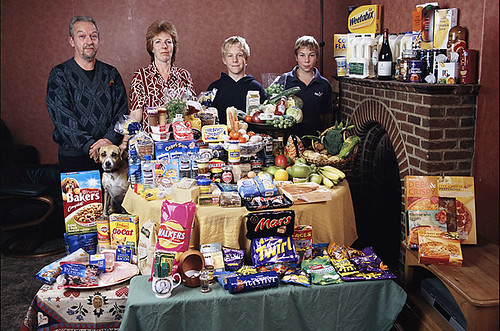Hungry Planet
Friday, 8 June 2007 by Hock

For those of you that don't read boing boing
Here is a link that they recommend checking out, follow it to a most excellent slide show of photos taken by Peter Menzel. Collaborating with Faith D'Aluisio to which they wrote Hungry Planet: What the world eats looks like a good read.

quite surprised the german family is the most expensive. i usually estimate about 10 euros per day for me including takeaway coffee, bottle of wine and what have you. (between 10 - 20% of my income depending on what month it is).
very interesting to see those photos... nice character studies... i love the Kuwait family & the first US family.
seems the developed world eats a lot more pizza & bread huh
regarding undeveloped countries' hunger and G8s 'Africa' discussions (!)
i thought der Spiegel was a reasonably unbiased paper but they've been touting Merkel's G8 performance as a success (including her aid pledges towards alleviating poverty in Africa) and that she 'even made Bono happy' (This revolting claim is also in fact not true, i randomly saw some live aid footage where Bob Geldof told a German reporter he & Bono were 'disappointed' in Merkel).
Think I am gonna stick to reading the NY Times.
speaking of the NY Times, here is an article about a prominent advocate of what u mentioned on your other blog, Maytel: allowing workers to cross borders along with cheap sneakers and rice.
(side note: there is an awesome song by Die Goldenen Zitronen, about how it would be easier to get into the EU from Turkey if you were a sneaker)
the guy Pritchett is a Harvard professor and influential ex-World Bank economist. the article is mostly a portrait of him, but it's encouraging..
"The gains from increased trade, though sizable in many economists’ view, had mostly taken place. Aid and debt relief were generally seen as limited tools. The whole notion of big ideas was out of favor. “So little seems to work,” Pritchett warned in an article — “What’s the Big Idea” — that disparaged big ideas. Yet he was mulling a big idea of his own. True to form, it was a stink-bomb-in-the-bathroom kind of idea: an assault on the morality of borders.
“We’re already being morally coarsened by allowing people to live as fourth-class citizens in the rest of the world,” Pritchett says. “We’re just not forced to confront it.” Scale? Yes, his plan would start small (by global terms), but Pritchett argues that it contains the seeds of its own expansion. With lots of old people to support, rich countries will “get hooked on” the migrants’ labor and especially on the taxes they pay into retiree health and pension funds. And if, as critics fear, the migrants stay, then yes, Pritchett does believe the U.S. could eventually swallow 300 million of the global poor. “It’s a big, empty country,” he says.
With more access to global labor markets, Pritchett predicts some poor countries will develop quickly while others, like Zambia, will depopulate into giant ghost towns as the world grows comfortable with higher levels of permanent migration. Eventually — over a century, say — the combination of population adjustments and policy innovation will raise the living standards of most poor countries to that of the West without pulling the West down, just as the rise of the Japanese has not meant the fall of Americans. The labor forces of the West are shrinking, which, he says, should keep wages high despite increased migration. Whether or not his forecasts are correct — the track record of his field is not reassuring — he has pondered the economics.
(...)
“We’re already being morally coarsened by allowing people to live as fourth-class citizens in the rest of the world,” Pritchett says. “We’re just not forced to confront it.” Scale? Yes, his plan would start small (by global terms), but Pritchett argues that it contains the seeds of its own expansion. With lots of old people to support, rich countries will “get hooked on” the migrants’ labor and especially on the taxes they pay into retiree health and pension funds. And if, as critics fear, the migrants stay, then yes, Pritchett does believe the U.S. could eventually swallow 300 million of the global poor. “It’s a big, empty country,” he says.
With more access to global labor markets, Pritchett predicts some poor countries will develop quickly while others, like Zambia, will depopulate into giant ghost towns as the world grows comfortable with higher levels of permanent migration. Eventually — over a century, say — the combination of population adjustments and policy innovation will raise the living standards of most poor countries to that of the West without pulling the West down, just as the rise of the Japanese has not meant the fall of Americans. The labor forces of the West are shrinking, which, he says, should keep wages high despite increased migration. Whether or not his forecasts are correct — the track record of his field is not reassuring — he has pondered the economics.
But the greatest risk posed by the Pritchett plan is cultural conflict, or even conflagration, which Pritchett greets with a shrug. “I don’t think about it a lot because I’m an economist,” he says. “If you say your culture can’t survive an influx of migrants, you have a pretty dim view of your culture.” Cultures change all the time, he figures, and change is not to be feared. A century hence, nations will still exist, but in a more ecumenical way. Germans will accept Turkish mosques, and Turkey will accept Christian spires, and everyone will be free to come and go as long as they obey the law. Here he sounds less like Adam Smith than Rodney King: “Can’t we all just get along?”
http://www.nytimes.com/2007/06/10/magazine/10global-t.html?pagewanted=1&_r=1&ref=magazine
(may require u to join site to read; membership of nytime site is free)
oops my cutting and pasting skills leave much to be desired!
yeah, I saw the article, we get the International Herald Tribune slipped under our door every day (so good) and mostly it is a NYT cut and paste job too
:)
i should subscribe too... for some reason the Guardian is much more common on newstands here... their weekend supplements can be good (book reviews, Dave Eggers-written stories) but its all so... wet?
hard to see this guy Pritchett making much headway given recent illegal immigrant 'amnesty' stuff in the states. also Merkel is firmly opposed to Turkey entering the E.U. Will be pretty interesting when that happens!
interesting that it is coming to a head now....I remember the whole issue floating around my geog dept when I was an undergrad and that was a veery long time ago...my god, I can't believe I am still at university